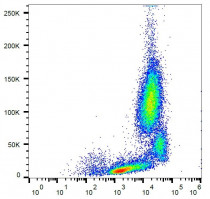ARG53781
anti-CD18 / LFA1 beta antibody [MEM-148] (PE)
anti-CD18 / LFA1 beta antibody [MEM-148] (PE) for Flow cytometry and Human
Developmental Biology antibody; Immune System antibody; Signaling Transduction antibody
Overview
| Product Description | PE-conjugated Mouse Monoclonal antibody [MEM-148] recognizes CD18 / LFA1 beta |
|---|---|
| Tested Reactivity | Hu |
| Species Does Not React With | Pig |
| Tested Application | FACS |
| Specificity | The clone MEM-148 recognizes an epitope on CD18 which is essentially inaccessible in intact integrin molecules on resting leukocytes, but is exposed on high-affinity state of LFA-1 or on unassociated CD18. CD18 (integrin beta2 subunit; beta2 integrin) is a 90-95 kDa type I transmembrane protein expressed on all leukocytes. HLDA VI; WS Code AS A052 |
| Host | Mouse |
| Clonality | Monoclonal |
| Clone | MEM-148 |
| Isotype | IgG1 |
| Target Name | CD18 / LFA1 beta |
| Immunogen | Peripheral blood mononuclear cells |
| Conjugation | PE |
| Alternate Names | MF17; LAD; CD antigen CD18; MFI7; MAC-1; Cell surface adhesion glycoproteins LFA-1/CR3/p150,95 subunit beta; LCAMB; Integrin beta-2; Complement receptor C3 subunit beta; LFA-1; CD18 |
Application Instructions
| Application Suggestion |
|
||||
|---|---|---|---|---|---|
| Application Note | * The dilutions indicate recommended starting dilutions and the optimal dilutions or concentrations should be determined by the scientist. |
Properties
| Form | Liquid |
|---|---|
| Purification Note | The purified antibody is conjugated with R-Phycoerythrin (PE) under optimum conditions. The conjugate is purified by size-exclusion chromatography and adjusted for direct use. No reconstitution is necessary. |
| Buffer | PBS, 15 mM Sodium azide and 0.2% (w/v) high-grade protease free BSA |
| Preservative | 15 mM Sodium azide |
| Stabilizer | 0.2% (w/v) high-grade protease free BSA |
| Storage Instruction | Aliquot and store in the dark at 2-8°C. Keep protected from prolonged exposure to light. Avoid repeated freeze/thaw cycles. Suggest spin the vial prior to opening. The antibody solution should be gently mixed before use. |
| Note | For laboratory research only, not for drug, diagnostic or other use. |
Bioinformation
| Database Links | |
|---|---|
| Gene Symbol | ITGB2 |
| Gene Full Name | integrin, beta 2 (complement component 3 receptor 3 and 4 subunit) |
| Background | CD18, integrin beta2 subunit, forms heterodimers with four types of CD11 molecule to constitute leukocyte (beta2) integrins: alphaLbeta2 (CD11a/CD18, LFA-1), alphaMbeta2 (CD11b/CD18, Mac-1, CR3), alphaXbeta2 (CD11c/CD18) and alphaDbeta2 (CD11d/CD18). In most cases, the response mediated by the integrin is a composite of the functions of its individual subunits. These integrins are essential for proper leukocyte migration, mediating intercellular contacts. Absence of CD18 leads to leukocyte adhesion deficiency-1; severe reduction of CD18 expression leads to the development of a psoriasiform skin disease. CD18 is also a target of Mannheimia (Pasteurella) haemolytica leukotoxin and is sufficient to mediate leukotoxin-mediated cytolysis. |
| Function | Integrin alpha-L/beta-2 is a receptor for ICAM1, ICAM2, ICAM3 and ICAM4. Integrins alpha-M/beta-2 and alpha-X/beta-2 are receptors for the iC3b fragment of the third complement component and for fibrinogen. Integrin alpha-X/beta-2 recognizes the sequence G-P-R in fibrinogen alpha-chain. Integrin alpha-M/beta-2 recognizes P1 and P2 peptides of fibrinogen gamma chain. Integrin alpha-M/beta-2 is also a receptor for factor X. Integrin alpha-D/beta-2 is a receptor for ICAM3 and VCAM1. Triggers neutrophil transmigration during lung injury through PTK2B/PYK2-mediated activation. [UniProt] |
| Research Area | Developmental Biology antibody; Immune System antibody; Signaling Transduction antibody |
| Calculated MW | 85 kDa |
| PTM | Both Ser-745 and Ser-756 become phosphorylated when T-cells are exposed to phorbol esters (PubMed:11700305). Phosphorylation on Thr-758 (but not on Ser-756) allows interaction with 14-3-3 proteins (PubMed:11700305, PubMed:16301335). |
Images (1) Click the Picture to Zoom In
Clone References








